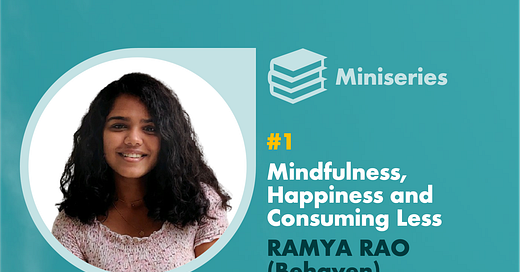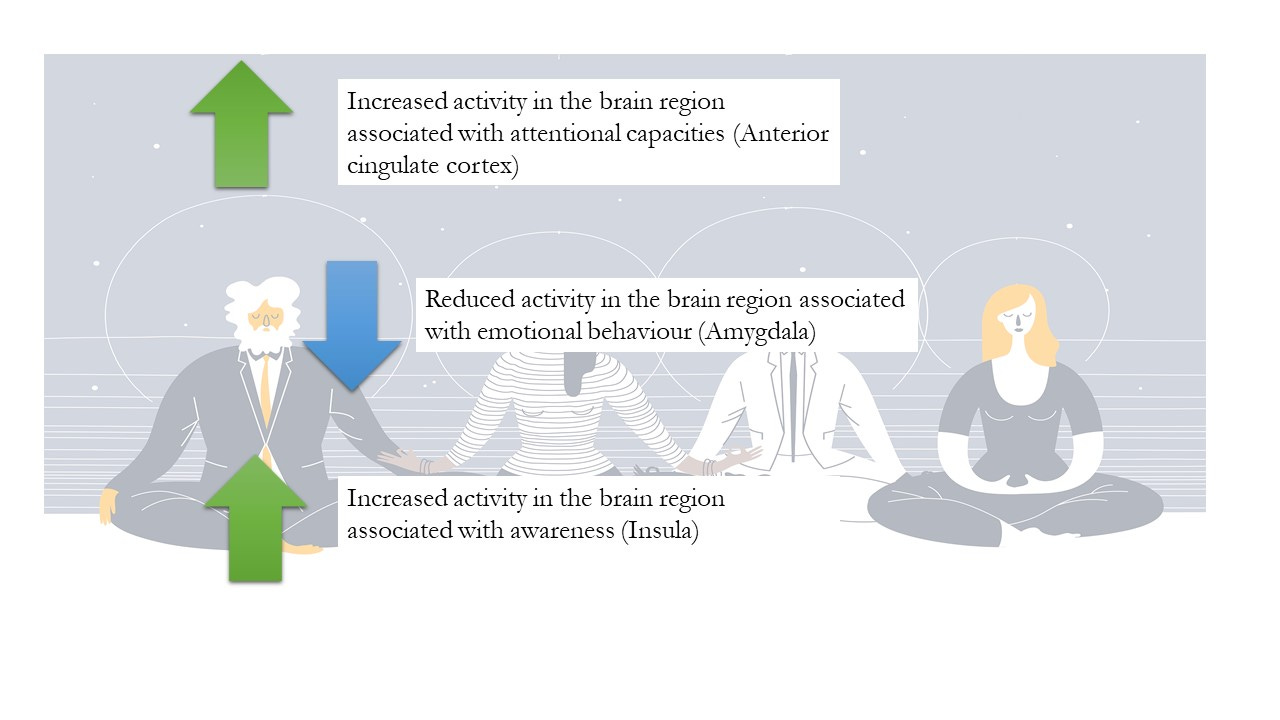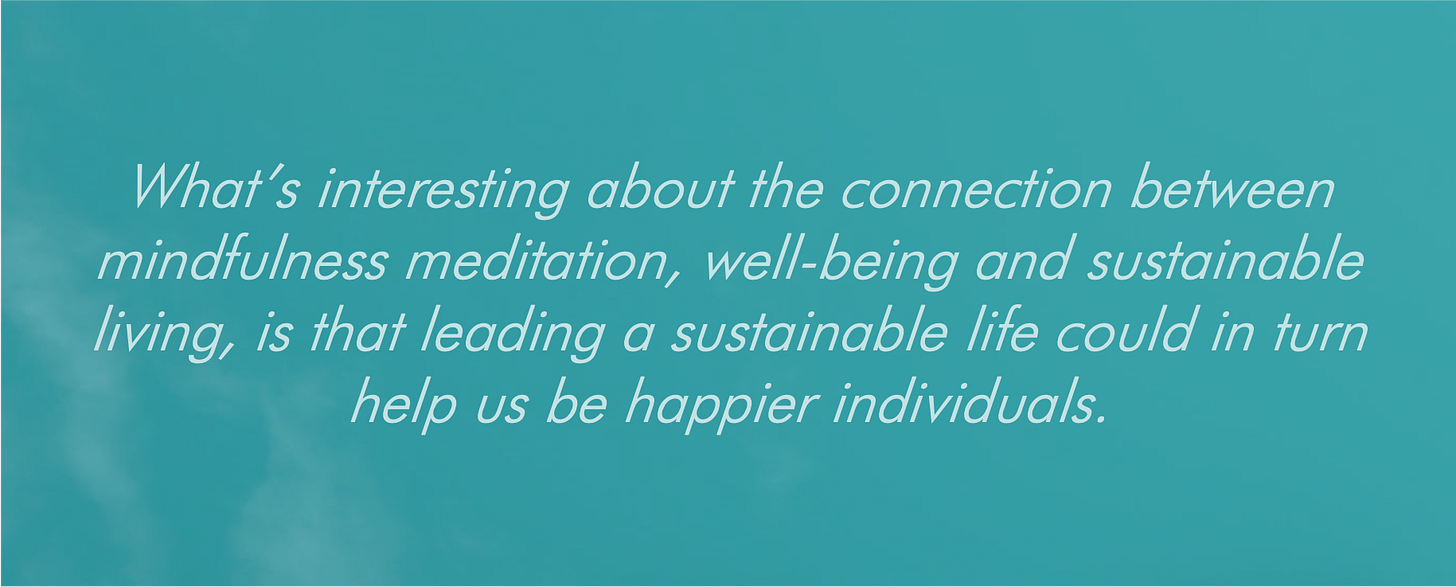Mindfulness, Happiness and Consuming Less, by Ramya Rao
Ramya Rao holds a master’s degree in Behavioural and Cognitive Neurosciences from the University of Groningen. She currently is a behavioural sustainability intern at Behaven. In this first article of a three-part series, Ramya explores the link between mindfulness meditation, well-being and sustainable living. And whether living a sustainable life could also help us to be happier. Is the pursuit of happiness the ultimate environmental act?
Shopping for what we need (and what we don’t) has never been easier. The overarching idea that consumption is a source of happiness is constantly reinforced by the growth of online shopping, advertising and marketing strategies, and tailored social media ads.
And this idea has unfortunately contributed to an unsustainable society causing costly environmental damages. We seem to invest in a lot of things that we don’t need but desire to own or experience in some capacity.
Why is this the case? Dr Juliet B. Schor, a former professor of Economics at Harvard University, describes the reasons we tend to over-consume as a society in what she calls a ‘cycle of work and spend"‘ and ‘consumption competitiveness’.
Consumption tends to be the most common reward for long work hours. For instance, luxurious vacations, shopping vouchers, spa treatments or restaurant meals. This doesn’t reduce the workload of employees — and therefore makes it harder for them to find leisure time or improve their overall well-being — but it does increase consumption.
In the ‘90s, ‘consumption competitiveness’ was mostly restricted to comparing one’s materialistic possessions within one’s neighbourhood; or what is popularly called ‘Keeping up with the Joneses’. At the turn of the 21st century however, the reference groups shifted from neighbours to celebrities and influencers around the world.
The Pursuit of Happiness
As consumers, we impact the environment through upstream carbon emissions, pollution and the depletion of resources associated with the production of our purchased items. The consequences of indulging in an endless consumption of materialistic goods believing that it will make us happy is a threat not only to planetary health but also to our own mental health.
Years of research supports the idea that materialistic goals are negatively linked to our well-being. How do we then disassociate happiness from sources such as materialistic consumption? While systemic change and change in our current capitalistic model are vital to tackle uncontrolled consumption, change at the individual level is also just as important.
When we change the way we think about what truly makes us happy, we’re likely to find the sources of happiness outside of our drive to consume mindlessly. Since reducing our consumption can limit environmental degradation, it looks like seeking true happiness can indeed have lasting benefits on the environment.
A high income seems to be one of the causes of overconsumption and hence the perceived source of happiness. Research tells us that the younger generations are consistently aspiring to obtain high incomes and gain the ability to consume things that scream of a high social standing. However, research also shows that income contributes to happiness only until our subsistence needs are satisfied; after which more money does not equal more happiness. This was recently contradicted by a study suggesting that more money (above $75,000 per year) could mean more happiness. But interestingly, the author of the paper Matthew Killingsworth, expressed in an interview that this finding was more complex than just ‘money can buy happiness’. He found that “people who equated money with success were less happy than those who didn’t” and that these high earners were in general more pressed for time. But then, how do we begin to seek true happiness?
Life is in the ‘Now’
Imagine you’re by the ocean at dusk and your feet are being washed over by the waves. Think of a time when a cool breeze hit you on a hot summer afternoon. Or the feeling of a big hug from an old friend. These instances where we find a sense of true joy involves us surrendering to the present moment.
The traditional practice of mindfulness meditation guides us to do exactly this. Mindfulness as a concept rooted in Buddhist traditions is continually growing in importance in the western world, especially in the context of improving one’s mental health. In its simplest form, it is the practice of being aware of the present moment (as usually guided by meditation), involving no interpretation or judgement.
Mindfulness is known to generate a sense of care for the self, nature and society but how exactly does it play a role in addressing overconsumption or our relationship with materialism?
We spoke to Dr. Ute Thiermann, a leading postdoctoral researcher in mindfulness. She emphasizes on the greater benefits of mindfulness practices that go beyond our ability to self-regulate and drive forward a desired behaviour — it involves fostering empathy, compassion, connectedness and love. She says “mindfulness is not about a quick pill to change people, it’s about changing world-views, mindsets and perspectives”. It allows us to become individuals who find happiness in experiences rather than materialistic goods, thus becoming more mindful of our consumption patterns while increasing our well-being.
Our Brain on Mindfulness Meditation
The benefits of mindfulness meditation can be observed quite clearly through the brain activity of those who are involved in this practice. According to years of neuroscientific research, mindfulness mediation helps us to be more attentive of our actions, better regulating our emotions in various experiences and being more self-aware in our everyday choices and decisions. This was observed with the help of neuroimaging tools like fMRI (functional magnetic resonance imaging), even in beginners.
Another popular way of measuring brain activity is electroencephalography (EEG). EEG records electrical activity in the brain i.e., brain waves of different frequencies, through electrodes placed along the scalp of the individual. Research using EEG showed that an attentive, meditative state in individuals gave rise to an emotionally positive blissful experience, and this was associated with heightened theta wave activity in the brain. A theta wave is the electrical activity of low-frequency (4-7Hz) that usually occurs during meditative, drowsy or hypnotic states i.e., relates to the subconscious mind. Interestingly, heightened theta activations were also observed in ‘green’ consumers i.e., those who chose sustainable products when compared to ‘non-green’ consumers i.e., those who chose unsustainable products, in a lab-based experiment.
With more research in this space, a link connecting mindfulness meditation, happiness and sustainable consumption could potentially be established in the future.
Meditating for Ourselves and the Planet
Mindfulness mediation could help us reduce our consumption in the following ways:
It has been shown to result in reduced automaticity i.e., we are more capable of breaking everyday automatic habits and behaviours. This includes our impulsive shopping behaviours (buying what we need vs what we want).
It fosters compassion and empathy i.e., we begin to think of all of the actors involved in the creation of our products and grow a sense of connectedness and compassion (e.g. The dire working conditions of labourers in fast fashion). Realising that we are all connected could ensure that we consume mindfully.
What’s interesting about the connection between mindfulness meditation, well-being and sustainable living, is that leading a sustainable life could in turn help us be happier individuals. Who doesn’t love a win-win situation?
Being mindful is thus a powerful act of self-love that goes hand-in-hand with the welfare of our planet. One breath at a time, it seems like seeking happiness is truly an empowering act of environmentalism.
Coming up next : in the next episode of Good Moves, Ramya will explore our ‘connectedness to nature’ and how this allows us to lead a more fulfilling and sustainable life.








